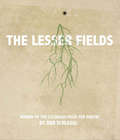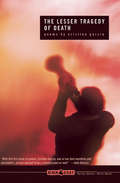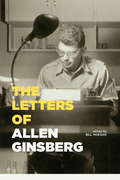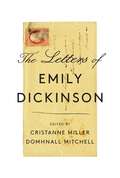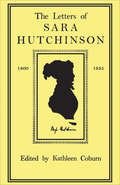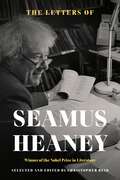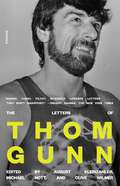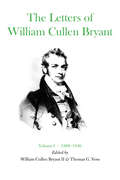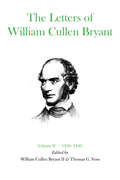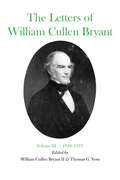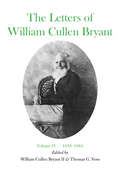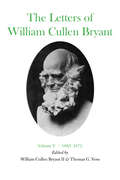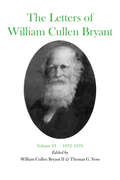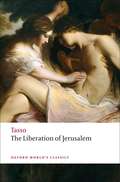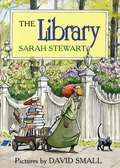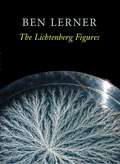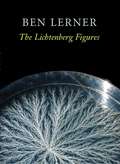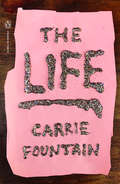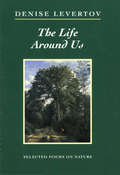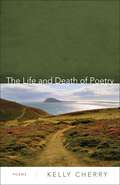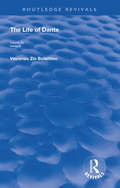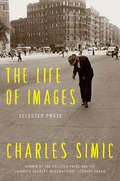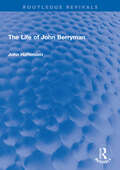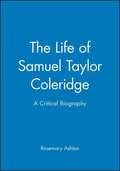- Table View
- List View
The Lesser Fields (Colorado Prize for Poetry)
by Rob SchlegelWinner of the 2009 Colorado Prize for Poetry Published by the Center for Literary Publishing at Colorado State University
The Lesser Tragedy of Death (Black Goat)
by Cristina GarcíaFrom the National Book Award-nominated author of Dreaming in Cuban, &“breathtakingly beautiful&” poems about her troubled, self-destructive brother (The Austin Chronicle). &“[A] brave and moving tribute to a brother gone astray; with skill, unflinching honesty, and redemptive compassion, Cristina García tracks his marvelous, complex, and errant life…These poems are the beautiful, painful, astonishing result of a journey to hell and back in search of the brother she loves. With this first book of poems, García, one of our best novelists and storytellers, proves herself to be a talented poet as well.&”—Julia Alvarez, author of Saving the World &“Garcia&’s spare language lucidly invokes the brother&’s insistence on remaining a wreck and the speaker&’s helplessness to stop him.&”—The Adirondack Review
The Letters of Allen Ginsberg
by Bill Morgan Allen GinsbergThe best of poet Allen GinsbergOCOs correspondence with friends like Jack Kerouac and William S. Burroughs, edited by the authorOCOs longtime literary archivist. "
The Letters of Emily Dickinson
by Emily DickinsonThe definitive edition of Emily Dickinson’s correspondence, expanded and revised for the first time in over sixty years.Emily Dickinson was a letter writer before she was a poet. And it was through letters that she shared prose reflections—alternately humorous, provocative, affectionate, and philosophical—with her extensive community. While her letters often contain poems, and some letters consist entirely of a single poem, they also constitute a rich genre all their own. Through her correspondence, Dickinson appears in her many facets as a reader, writer, and thinker; social commentator and comedian; friend, neighbor, sister, and daughter.The Letters of Emily Dickinson is the first collected edition of the poet’s correspondence since 1958. It presents all 1,304 of her extant letters, along with the small number available from her correspondents. Almost 300 are previously uncollected, including letters published after 1958, letters more recently discovered in manuscript, and more than 200 “letter-poems” that Dickinson sent to correspondents without accompanying prose. This edition also redates much of her correspondence, relying on records of Amherst weather patterns, historical events, and details about flora and fauna to locate the letters more precisely in time. Finally, updated annotations place Dickinson’s writing more firmly in relation to national and international events, as well as the rhythms of daily life in her hometown. What emerges is not the reclusive Dickinson of legend but a poet firmly embedded in the political and literary currents of her time.Dickinson’s letters shed light on the soaring and capacious mind of a great American poet and her vast world of relationships. This edition presents her correspondence anew, in all its complexity and brilliance.
The Letters of Robert Frost
by Robert FrostOne of the acknowledged giants of twentieth-century American literature, Robert Frost was a public figure much celebrated in his day. Although his poetry reached a wide audience, the private Frost--pensive, mercurial, and often very funny--remains less appreciated. Following upon the publication of Frost's notebooks and collected prose, "The Letters of Robert Frost" is the first major edition of the poet's written correspondence. The hundreds of previously unpublished letters in these annotated volumes deepen our understanding and appreciation of this most complex and subtle of verbal artists. Volume One traverses the years of Frost's earliest poems to the acclaimed collections "North of Boston "and "Mountain Interval "that cemented his reputation as one of the leading lights of his era. The drama of his personal life--as well as the growth of the audacious mind that produced his poetry--unfolds before us in Frost's day-to-day missives. These rhetorical performances are at once revealing and tantalizingly evasive about relationships with family and close friends, including the poet Edward Thomas. We listen in as Frost defines himself against contemporaries Ezra Pound and William Butler Yeats, and we witness the evolution of his thoughts about prosody, sound, style, and other aspects of poetic craft. In its literary interest and sheer display of personality, Frost's correspondence is on a par with the letters of Emily Dickinson, Robert Lowell, and Samuel Beckett. "The Letters of Robert Frost" holds hours of pleasurable reading for lovers of Frost and modern American poetry.
The Letters of Sara Hutchinson
by Kathleen Coburn Sara HutchinsonSarah Hutchinson has never been much more than a name, though a name connected with some of the greatest in English literature. The sister of Mrs. Wordsworth, and a member of the Wordsworth household for thirty years, Coleridge's beloved Asra to whom many of his poems were written, Southey's friend and Lamb's, and a guest of the Arnolds at Rugby, she was a member of an interesting circle. For her intimate relations to Wordsworth and Coleridge it has long been apparent that we should like to know her better. Now her letters to members of her family and to friends demonstrate how worthwhile it is to know her for herself as well.<P><P>The letters come from the family and from the Wordsworth collection at Dove Cottage and are here printed (almost in full) for the first time.<P>They show a lively and amusing woman, kind, forthright to the extent of bluntness, especially when she takes up the cudgels in the cause of what she considers truth or justice or human kindness. Coleridge describes her in one apt and characteristic sentence: <P>'If Sense, Sensibility, Sweetness of Temper, perfect simplicity and unpretending Nature, joined to shrewdness and entertainingness make a valuable Woman, Sara Hutchinson is so.'<P>Such qualities certainly make a delightful letter-writer.
The Letters of Seamus Heaney
by Seamus HeaneyThe letters provide us with an intimate, multilayered understanding of this extraordinary poet’s life and mind.Every now and again I need to get down here, to get into the Diogenes tub, as it were, or the Colmcille beehive hut, or the Mossbawn scullery. At any rate, a hedge surrounds me, the blackbird calls, the soul settles for an hour or two.In this astute selection from Seamus Heaney’s vast correspondence, we are given direct access to the life and poetic development of a literary titan, from his early days in Belfast, through his controversial decision to settle in the Republic, to the gradual broadening of horizons that culminated in the award of the Nobel Prize in Literature and the years of international eminence that kept him heroically busy until his death.Christopher Reid draws from both public and private archives to reveal this remarkable story in the poet’s own words. Generous, funny, exuberant, confiding, irreverent, empathetic, and deeply thoughtful, The Letters of Seamus Heaney encompasses decades-long relationships with friends and colleagues, as well as an unstinted responsiveness to passing acquaintances.Heaney’s mastery of language is as evident here as it is in any of his writings; listening to his voice we find ourselves in the same room as a man whose presence enriched the world and whose legacy deepens our sense of what truly matters.
The Letters of Thom Gunn
by Thom GunnThe Letters of Thom Gunn presents the first complete portrait of the private life, reflections, and relationships of a maverick figure in the history of British and American poetry. “I write about love, I write about friendship,” remarked Thom Gunn. “I find that they are absolutely intertwined.” These core values permeate his correspondence with friends, family, lovers, and fellow poets, and they shed new light on “one of the most singular and compelling poets in English during the past half-century” (Hugh Haughton, The Times Literary Supplement). The Letters of Thom Gunn, edited by August Kleinzahler, Michael Nott, and Clive Wilmer, reveals the evolution of Gunn’s work and illuminates the fascinating life that informed his poems: his struggle to come to terms with his mother’s suicide; settling in San Francisco and his complex relationship with England; his changing relationship with his life partner, Mike Kitay; the LSD trips that led to his celebrated collection Moly (1971); and the deaths of friends from AIDS that inspired the powerful, unsparing elegies of The Man with Night Sweats (1992).
The Letters of William Cullen Bryant: Volume I, 1809–1836
by William Cullen BryantThis is the only collection ever made of Bryant's letters, two-thirds of which have never before been printed. Their publication was foreseen by the late Allan Nevin as "one of the most important and stimulating enterprises contributory to the enrichment of the nation's cultural and political life that is now within range of individual and group effort.William Cullen Bryant (1794–1878) was America's earliest national poet. His immediate followers—Longfellow, Poe, and Whitman—unquestionably began their distinguished careers in imitation of his verses. But Bryant was even more influential in his long career as a political journalist, and in his encouragement of American art, from his lectures at the National Academy of Design in 1828 to his evocation of the Metropolitan Museum of Art in 1870. Between the appearance of his first major poem, "Thanatopsis," in 1817, and his death sixty-one years later at the age of eight-three, Bryant knew and corresponded with an extraordinary number of eminent men and women. More than 2,100 of his know letters have already been recovered for the present edition.When William Cullen Bryant signed the first of 314 letters in the present volume, in 1809, he was a frail and shy farm boy of fourteen who had nonetheless already won some fame as the satirist of Thomas Jefferson. When he wrote the last, in 1836, he had become the chief poet of his country, the editor of its principal liberal newspaper, and the friend and collaborator of its leading artists and writers. His collected poems, previously published at New York, Boston, and London, were going into their third edition. His incisive editorials in the New York Evening Post were affecting the decisions of Andrew Jackson's administration. His poetic themes were beginning to find expression in the landscape paintings of Robert Weir, Asher Durand, and Thomas Cole.The early letters gathered here in chronological order give a unique picture of Cullen Bryant's youth and young manhood: his discipline in the classics preparatory to an all-too-brief college tenure; his legal study and subsequent law practice; the experiments with romantic versification which culminated in his poetic masterpieces, and those with the opposite sex which led to his courtship and marriage; his eager interest in the politics of the Madison and Monroe Presidencies, and his subsequent activities as a local politician and polemicist in western Massachusetts; his apprenticeship as magazine editor and literary critic in New York City, from which his later eminence as journalist was the natural evolution; the lectures on poetry and mythology which foreshadowed a long career as occasional orator; the collaboration in writing The Talisman, The American Landscape, and Tales of Glauber-Spa, and in forming the National Academy of Design, and the Sketch Club, which brought him intimacy with writers, artists, and publishers; his first trip to the Aemrican West, and his first long visit to Europe, during which he began the practice of writing letters to his newspaper which, throughout nearly half a century, proved him a perceptive interpreter of the distant scene to his contemporaries.Here, in essence, is the first volume of the autobiography of one whom Abraham Lincoln remarked after his first visit to New York City in 1860, "It was worth the journey to the East merely to see such a man." And John Bigelow, who of Bryant's many eulogists knew him best, said in 1878 of his longtime friend and business partner, "There was no eminent American upon whom the judgment of his countrymen would be more immediate and unanimous. The broad simple outline of his character and career had become universally familiar, like a mountain or a sea."
The Letters of William Cullen Bryant: Volume II, 1836–1849
by William Cullen BryantThe second volume of William Cullen Bryant's letters opens in 1836 as he has just returned to New York from an extended visit to Europe to resume charge of the New York Evening Post, brought near to failure during his absence by his partner William Leggett's mismanagement. At the period's close, Bryant has found in John Bigelow an able editorial associate and astute partner, with whose help he has brought the paper close to its greatest financial prosperity and to national political and cultural influence.Bryant's letters lf the years between show the versatility of his concern with the crucial political, social, artistic, and literary movements of his time, and the varied friendships he enjoyed despite his preoccupation with a controversial daily paper, and with the sustenance of a poetic reputation yet unequaled among Americans. As president of the New York Homeopathic Society, in letters and editorials urging widespread public parks, and in his presidency of the New York Society for the Abolition of the Punishment of Death, he gave attention to public health, recreation, and order. He urged the rights of labor, foreign and religious minorities, and free African Americans; his most powerful political effort of the period was in opposition to the spread of slavery through the conquest of Mexico. An early commitment to free trade in material goods was maintained in letters and editorials, and to that in ideas by his presidency of the American Copyright Club and his support of the efforts of Charles Dickens and Harriet Martineau to secure from the United States Congress and international copyright agreement.Bryant's first visit to Great Britain came at the height of his poetic and journalistic fame in 1845, bringing him into cordial intimacy with members of Parliament, scientists, journalists, artists, and writers. In detailed letters to his wife, published here for the first time, he describes the pleasures he took in breakfasting with the literary patron Samuel Rogers and the American minister Edward Everett, boating on the Thames with artists and with diarist Henry Crabb Robinson, spending an evening in the home of Leigh Hunt, and calling on the Wordsworths at Rydal Mount as well as in the distinctions paid him at a rally of the Anti-Corn-Law League in Covent Garden Theatre, and at the annual meeting in Cambridge of the British Association for the Advancement of Science.Equally fresh are most of the letters to prominent Americans, many of them his close friends, such as the two Danas, Bancroft, Cole, Cooper, Dewey, Dix, Downing, Durand, Forrest, Greenough, Irving, Longfellow, Simms, Tilden, Van Buren, and Weir. His letters to the Evening Post recounting his observations and experiences during travels abroad and in the South, West, and Northeast of the United States, which were copied widely in other newspapers and praised highly by many of their subscribers, are here made available to the present-day reader.
The Letters of William Cullen Bryant: Volume III, 1849–1857
by William Cullen BryantDuring the years covered in this volume, Bryant traveled more often and widely than at any comparable period during his life. The visits to Great Britain and Europe, a tour of the Near East and the Holy Land, and excursions in Cuba, Spain, and North Africa, as well as two trips to Illinois, he described in frequent letters to the Evening Post. Reprinted widely, and later published in two volumes, these met much critical acclaim, one notice praising the "quiet charm of these letters, written mostly from out-of-the-way places, giving charming pictures of nature and people, with the most delicate choice of words, and yet in the perfect simplicity of the true epistolary style."His absence during nearly one-fifth of this nine-year period reflected the growing prosperity of Bryant's newspaper, and his confidence in his editorial partner John Bigelow and correspondents such as William S. Thayer, as well as in the financial acumen of his business partner Isaac Henderson. These were crucial years in domestic politics, however, and Bryant's guidance of Evening Post policies was evident in editorials treating major issues such as the Compromise of 1850, the Fugitive Slave Law, the Kansas-Nebraska Bill, the rise of the Republican Party, and the Dred Scott Decision, as well as in his correspondence with such statesmen as Salmon P. Chase, Hamilton Fish, William L. Marcy, Edwin D. Morgan, and Charles Sumner. His travel letters and journalistic writings reflected as well his acute interest in a Europe in turmoil. In France and Germany he saw the struggles between revolution and repression; in Spain he talked with journalists, parliamentary leaders, and the future president of the first Spanish republic; in New York he greeted Louis Kossuth and Giuseppe Garibaldi.Bryant's close association with the arts continued. He sat for portraits to a dozen painters, among them Henry P. Gray, Daniel Huntington, Asher Durand, Charles L. Elliott, and Samuel Laurence. The landscapists continued to be inspired by his poetic themes. Sculptor Horatio Greenough asked of Bryant a critical reading of his pioneering essays on functionalism. His old friend, the tragedian Edwin Forrest, sought his mediation in what would become the most sensational divorce case of the century, with Bryant and his family as witnesses. His long advocacy of a great central park in New York was consummated by the legislature. And in 1852, his eulogy on the life of James Fenimore Cooper became the first of several such orations which would establish him as the memorialist of his literary contemporaries in New York.
The Letters of William Cullen Bryant: Volume IV, 1858–1864
by William Cullen BryantThe years just before and during the Civil War marked the high point of Bryant's influence on public affairs, which had grown steadily since the Evening Post had upheld the democratic Jacksonian revolution of the 1830s. A founder of the Free Soil Party in 1848 and the Republican Party in 1856, Bryant was lauded in 1857 by Virginia anti-slavery leader John Curtis Underwood, who wrote to Eli Thayer, "What a glory it would be to our country if it could elect this man to the Presidency-the country not he would be honored & elevated by such an event."In 1860 Bryant helped secure the Presidential nomination for Abraham Lincoln, and was instrumental in the choice of two key members of his cabinet, Salmon Chase as Secretary of the Treasury, and Gideon Welles as Secretary of the Navy. During disheartening delays and defeats in the early war years, direct communications from Union field commanders empowered his editorial admonitions to such a degree that the conductor of a national magazine concluded that the Evening Post's "clear and able political leaders have been of more service to the government of this war than some of its armies."Bryant's correspondence with statesmen further reflects the immediacy of his concern with military and political decisions. There are thirty-five known letters to Lincoln, and thirty-two to Chase, Welles, war secretary Stanton, and Senators Fessenden, Morgan, and Sumner.This seven-year passage in Bryant's life, beginning with his wife's critical illness at Naples in 1858, concludes with a unique testimonial for his seventieth birthday in November 1864. The country's leading artists and writers entertained him at a "Festival" in New York's Century Club, giving him a portfolio of pictures by forty-six painters as a token of the "sympathy" he had "ever manifested toward the Artists," and the "high rank" he had "ever accorded to art." Poets Emerson, Holmes, Longfellow, Lowell, and Whittier saluted him in prose and verse. Emerson saw him as "a true painter of the face of this country"; Holmes, as the "first sweet singer in the cage of our close-woven life." To Whittier, his personal and public life sounded "his noblest strain." And in the darkest hours of the war, said Lowell, he had "remanned ourselves in his own manhood's store," had become "himself our bravest crown."
The Letters of William Cullen Bryant: Volume V, 1865–1871
by William Cullen BryantOn April 26, 1865, as Abraham Lincoln's funeral cortege paused in Union Square, New York, before being taken by rail to Springfield, Illinois, William Cullen Bryant listened as his own verse elegy for the slain president was read to a great concourse of mourners by the Reverend Samuel Osgood. Only five years earlier and a few blocks downtown, at Cooper Union, Bryant had introduced the prairie candidate to his first eastern audience. There his masterful appeal to the conscience of the nation prepared the way for his election to the presidency on the verge of the Civil War. Now, Bryant stood below Henry Kirke Brown's equestrian statue of George Washington, impressing Osgood as if he were "the 19tth Century itself thinking over the nation and the age in that presence." Bryant's staunch support of the Union cause throughout the war, and of Lincoln's war efforts, no less than his known influence with the president, led several prominent public figures to urge that he write Lincoln's biography. Oliver Wendell Holmes wrote him, "No man combines the qualities for his biographer so completely as yourself and the finished task would be a noble crown to a noble literary life." But Bryant declined, declaring his inability to record impartially critical events in which he had taken so central a part. Furthermore, while preoccupied with the editorial direction of the New York Evening Post, he was just then repossessing and enlarging his family's homestead at Cummington, Massachusetts, where he hoped his ailing wife might, during long summers in mountain air, regain her health. But in July 1866, Frances died of recurrent rheumatic fever, and, Bryant confessed to Richard Dana, he felt as "one cast out of Paradise." After France's death Bryant traveled with his daughter Julia for nearly a year through Great Britain and the Continent, where he met British statesman and novelist Edward Bulwer Lytton and French literary critic Hyppolyte Taine, renewed his friendship with Spanish poet Carolina Coronado, Italian liberator Giuseppe Garibaldi, and British and American artists, and visited the family of the young French journalist Georges Clemenceau, as well as the graves of earlier acquaintances Francis Lord Jeffrey and Elizabeth Barrett Browning. In his spare moments Bryant sought solace by beginning the translation of Homer, and Longfellow had found relief after his wife's tragic death by rendering into English Dante's Divine Comedy. Home again in New York, Bryant bought and settled in a house at 24 West 16th Street which would be his city home for the rest of his life. Here he completed major publications, including the Iliad and Odyssey of Homer and an exhaustive Library of Poetry and Song, and added to published tributes to earlier friends, such as Thomas Cole, Fenimore Cooper, and Washington Irving, memorial discourses on Fitz-Greene Halleck and Gulian Verplanck. In addition to his continued direction of the New York Homeopathic Medical college and the American Free Trade League, he was elected to the presidency of the Williams College Alumni Association, the International Copyright Association, and the Century Association, the club of artists and writers of which, twenty years earlier, he had been a principal founder and which he would direct for the last decade of his life.
The Letters of William Cullen Bryant: Volume VI, 1872–1878
by William Cullen BryantIn January 1872, Bryant traveled to Mexico City, where he was greeted warmly by President Benito Juarez; on this and other occasions he was feted for the Evening Post's sturdy condemnation in 1863 of the abortive invasion of Mexico, which was freshly remembered there. AT the close of his visit a local newspaper remarked that the "honors and hospitality which were so lavishly and generously conferred upon him were the spontaneous outpouring of a grateful people, who had not forgotten that when Mexico was friendless Mr. Bryant became her friend." Returning in April through New Orleans and up the Mississippi by steamboat to Cincinnati, he was greeted at a public reception by Governor Rutherford Hayes, who was pleased by his "winning and lovable" manners and "pithy" anecdotes.That spring Bryant built a library for his birthplace, Cummington, stocking it with several thousand books procured for him by the publisher George Palmer Putnam in New York and London. The following year, after the last of his many travels - this time a revisit to South Carolina and Florida - he made a similar gift to Roslyn. These benefactions won him honorary membership in the newly formed American Library Association, and an invitation to open a library at Princeton University, which made him an honorary doctor of letters. Ultimately, in the final year of his life, his plans for the Bryant Library at Cummington, solicited from the White House by President Hayes, provided the basic design for the first presidential library in the country - that established by Hayes in Fremont, Ohio.An improbable by-product of the presidential race in 1872 was a proposal by leading journalists that Bryant become -in his seventy-eighth year - a candidate to oppose President Grant and his challenger for the Republican nomination, the mercurial editor of the New York Tribune, Horace Greeley. Bryant's immediate refusal to take the suggestion seriously was succinct, and tinged with humor. It was impossible, he declared in his newspaper, that he should receive the nomination, and "equally impossible," if it were offered, that he should "commit the folly of accepting it." Four years later he was distressed at being unable to switch his journal's support of the Republican candidate Hayes to the Democratic candidate, his old companion in political reform, Samuel Jones Tilden.As Bryant approached and entered his eighties, his writing and public speaking continued without slackening. Between 1872 and 1878 he published his collected Orations and Addresses, edited a revision of his anthology of poetry and two volumes of landscape sketches, Picturesque America, co-authored a four-volume Popular History of the United States, and undertook to co-edit a three-volume set of Shakespeare's plays, while also producing long monographs on several seventeenth-century English poets. He dedicated statues of Shakespeare, Walter Scott, and Fitz-Green Halleck in Central Park, and spoke elsewhere on Robert Burns, Benjamin Franklin, Goethe, and Shakespeare, gave speeches on Mexico and "National Honesty," and presided over the founding of the State Charities Aid Association. He was honored in Albany at receptions by each house of the legislature. For his eightieth birthday, his life's work was celebrated in silver on a Tiffany vase given him by admirers throughout the country.Bryant's last public act was to unveil, in Central Park, his brainchild of nearly a half century earlier: a bust of the Italian patriot Giuseppe Mazzini. Here, after exhaustion under the June sun, he fell and suffered a massive concussion followed by a stroke, which led to his death a fortnight later in his eighty-fourth year. A period of virtual national mourning preceded his funeral and his burial beside his wife at Roslyn. At one of many memorial services, a eulogist exclaimed, "The broad outline of his character had become universally familiar, like a mountain or a sea. Whoever saw Bryant saw America."
The Liberation of Jerusalem (Oxford World's Classics)
by Torquato Tasso Max WickertIn The Liberation of Jerusalem (1581), Torquato Tasso set out to write an epic to rival the Iliad and the Aeneid. Unlike his predecessors, he took his subject not from myth but from history: the Christian capture of Jerusalem during the First Crusade. The siege of the city is played out alongside a magical romance of love and sacrifice, in which the Christian knight Rinaldo succumbs to the charms of the pagan sorceress Armida, and the warrior maiden Clorinda inspires a fatal passion in the Christian Tancred. Tasso's masterpiece left its mark on writers from Spenser and Milton to Goethe and Byron, and inspired countless painters and composers. This is the first English translation in modern times that faithfully reflects both the sense and the verse form of the original. Max Wickert's fine rendering is introduced by Mark Davie, who places Tasso's poem in its troubled historical context and sheds light on its narrative framework and historical accuracy as well as its reception and influence.
The Library
by David Small Sarah Stewart<p>Meet an unforgettable bibliophile <p>Elizabeth Brown doesn't like to play with dolls and she doesnt like to skate. What she does like to do is read books. Lots of books. The only problem is that her library has gotten so big she can't even use her front door anymore. What should Elizabeth Brown do? Start her own public library, of course! With charming verse and watercolors Sarah Stewart and David Small celebrate one of America's oldest and finest institutions. <p>The Library is a 1995 New York Times Book Review Notable Children's Book of the Year and Outstanding Book of the Year.</p>
The Lichtenberg Figures
by Ben LernerWinner of the Hayden Carruth Award uses "broken sonnets" to explore complex juxtapositions of contemporary culture.
The Lichtenberg Figures
by Ben LernerThe Lichtenberg Figures, winner of the Hayden Carruth Award, is an unconventional sonnet sequence that interrogates the relationship between language and memory, violence and form. "Lichtenberg figures" are fern-like electrical patterns that can appear on (and quickly fade from) the bodies of people struck by lightning.Throughout this playful and elegiac debut--with its flashes of autobiography, intellection, comedy, and critique--the vocabulary of academic theory collides with American slang and the idiom of the Old Testament meets the jargon of the Internet to display an eclectic sensibility.Ben Lerner, the youngest poet ever published by Copper Canyon Press, is co-founder of No: a journal of the arts. He earned an MFA from Brown University and is currently a Fulbright scholar in Spain.
The Life (Penguin Poets)
by Carrie FountainAn acclaimed poet deepens her exploration of the domestic in a new collection of playful and wise poemsThe poems in Carrie Fountain's third collection, The Life, exist somewhere, as Rilke says, between "our daily life" and "the great work"--an interstitial space where sidelong glances live alongside shouts to heaven. In elegant, colloquial language, Fountain observes her children dressing themselves in fledgling layers of personhood, creating their own private worlds and personalities, and makes room for genuine marvels in the midst of routine. Attuned to the delicate, fleeting moments that together comprise a life, these poems offer a guide by which to navigate the signs and symbols, and to pilot if not the perfect life, the only life, the life we are given.
The Life Around Us: Selected Poems on Nature
by Denise LevertovAs Denise Levertov comments in her brief foreword to The Life Around Us, she has "shared with most poets in every time and place an ardent love of what my eyes and other senses revealed to me in the world we call nature. Yet in this selection of sixty-two poems chosen by the author "celebration and fear of loss are necessarily conjoined." The Life Around Us shows us both the eternal renewal of the natural world and its imperilment: "In these last few decades of the 20th century it has become ever clearer to all thinking people that although we humans are a part of nature ourselves, we have become, in multifarious ways, an increasingly destructive element within it, shaking and breaking 'the great web'--perhaps irremediably."
The Life and Death of Poetry: Poems
by Kelly CherryWinner of the 2013 L. E. Phillabaum Poetry AwardIn her ninth collection of poetry, Kelly Cherry explores the domain of language. Clear and accessible, the poems in The Life and Death of Poetry examine the intricacies and limitations of communication and its ability to help us transcend our world and lives.The poet begins with silence and animal sound before taking on literature, public discourse, and the particular art of poetry. The sequence "Welsh Table Talk" considers the unsaid, or unsayable, as a man, his daughter, and his daughter's friend sojourn on Bardsey Island in Wales with the father's female companion. The innocence and playful chatter of the children throw into sharp relief a desolate landscape and failed communication between the adults. In the book's final section, Cherry considers translation, great art's grand sublimity, and the relation of poetry -- the divine tongue -- to the everyday world. Witty, poignant, wise, and joyous, The Life and Death of Poetry offers a masterful new collection from an accomplished poet.
The Life of Dante (Routledge Revivals)
by Giovanni BoccaccioPublished in 1990: This book tells the life story of Dante, the poet and his work.
The Life of Images
by Charles SimicA collection of new and selected essays by the Pulitzer Prize winner and former poet laureateIn addition to being one of America's most famous and commended poets, Charles Simic is a prolific and talented essayist. The Life of Images brings together his best prose work written over twenty-five years.A blend of the thoughtful, comic, and tragic, the essays in The Life of Images explore subjects ranging from poetry to philosophy, photography, politics, and art, to Simic's childhood in a war-torn country. Culled from five collections, these works demonstrate the qualities that make Simic's poetry so original yet accessible. Whether he is pondering the relationship between history and the individual, or recalling growing up in Belgrade and New York City, Simic shares his distinctive take on the world and offers an intimate look into the life and mind of an immigrant.
The Life of John Berryman (Routledge Revivals)
by John HaffendenFirst published in 1982, The Life of John Berryman draws on extensive research in the USA and on an enormous collection of hitherto unpublished materials – journals, letters, stories and poetry –to build a biography that recounts in absorbing detail the public and private stages of John Berry man’s career. It also offers an intimate portrait of a creative artist: his compulsive self-presentation and self-reproach, his moral and artistic dilemmas, his dedication and his accomplishments. John Berryman occupies a central place among the outstanding poets of recent times. The course of his life ran between the extremes of personal degradation and artistic ecstasy. He suffered the early suicide of his father, the dominance of his mother, poverty and professional setbacks, psychiatric treatment, alcoholism, and sexual and spiritual vexation. He became an electrifying, fearful teacher and a loving, jealous friend. His mentors and close associates included Mark Van Doren, Richard Blackmur, Allen Tate, Robert Lowell and Saul Bellow. The years brought him spells of deep personal joy and artistic fulfilment, but all too heavy a hand of terrible suffering. The book will be an extremely interesting read for students of literature.
The Life of Samuel Taylor Coleridge: A Critical Biography
by Rosemary Ashton Claude RawsonRosemary Ashton explores the many facets of Samuel Taylor Coleridge's complex personality, by turns poet, critic, thinker, enchanting companion, feckless husband, fabled conversationalist and guilt-ridden opium addict.
